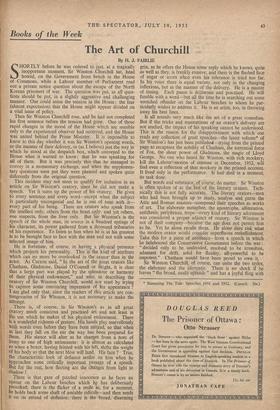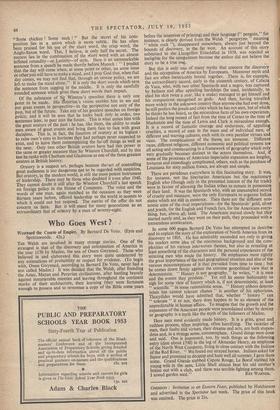Books of the Week
The Art of Churchill.
By H. J. FAIRLIE SHORTLY before he was ordered to rest, at a tragically inopportune moment, Sir Winston Churchill sat, head bowed, on the Government front bench in the House of. Commons, while a .Labour member of Parliament read out a private notice question about the escape of the North Korean prisoners of war. The question was put, as all ques- tions should be put, in a slightly aggressive and challenging manner. One could sense the tension in the House: the fear (almost expectation) that the House might appear divided on a vital issue of policy.
Then Sir Winston Churchill rose, and he had not completed his first sentence before the tension had gone. One of those rapid changes in the mood of the House which are sensible only to the experienced observer had occurred, and the House was united behind the Prime Minister. It is impossible to know to this day whether it was Sir Winston's opening words, or the manner of their delivery, or (as I believe) just the way in which he stood at the despatch box, which conveyed to the House what it wanted to know: that he was speaking for all of them. But it was precisely this that he managed to convey in a momentary exchange, and when the supplemen- tary questions were put they were phrased and spoken quite differently from the original question.
This incident may not seem to qualify for inclusion in an article on Sir Winston's oratory, since he did not make a speech. Yet it sums up the power of his oratory. He gives to every sentence and every word—except when the subject is particularly uncongenial and he is out of tune with it— every part of his being. There are orators who speak from the intellect only; others from the heart only; and yet others, one suspects, from the liver only. But Sir Winston's is the speech of the whole man, its source in a hundred springs of his character, its power gathered from a thousand tributaries of his experience. To listen to him when he is at his greatest is to be brought face to face with the man and not with some selected image of him.
He is fortunate, of course, in having a physical presence which projects his personality. This is the kind of attribute which can no more be overlooked in the orator than in the actor. As Curzon said, " In the art of the great orators like Chatham, Gladstone, Daniel O'Connell or Bright, it is clear that a large part was played by the splendour or harmony of their physical endowment," and who, in describing the oratory of Sir Winston Churchill, would not start by trying to capture some convincing impression of his appearance ? I am glad only that, since the readers of this article are con- temporaries of Sir Winston, it is not necessary to make the attempt. There is. of course, in Sir Winston's as in all great oratory much conscious and practised art and not least in the use which he makes of his physical endowment. There is a wonderful richness of gesture. His hands play marvellously With words even before they have been uttered, so that when at last they fall on the ear the way has been prepared for them. His stance will alter as he changes from a note of irony to one of high seriousness: it is almost as calculated as when a boxer, having feinted with his left, shifts the weight of his body so, that the next blow will land. His face ? True, the characteristic look of defiance settles on him when he approaches some critically important passage of a speech. But for the rest, how fleeting are the changes from light to shadow !
There is that gaze of puzzled innocence as he faces an uproar on the Labour benches which he has deliberately provoked; there is the flicker of a smile as, for a moment, he holds back some shaft of amiable ridicule—and then sends it on its errand of deflation; there is the broad, disarming * Stemming The Tide: Speeches 1951 and 1952. (Cassell. 300 grin, as he offers the House some reply which he knows, quite as well as they, is frankly evasive; and there is the flushed face of anger or scorn when even his tolerance is tried too far. In his voice there is equal variety, not only in the changing inflexions, but in the manner of the delivery. He is a master of timing. Each pause is deliberate and practised. He will fumble with a word—but all the time he is searching out some wretched offender on the Labour benches to whom he par- ticularly wishes to address it. He is an artist, too, in throwing away his best lines.
It all sounds very much like the art of a great comedian. But if the tricks and mannerisms of an orator's delivery are not studied, the impact of his speaking cannot be understood. This is the reason for the disappointment with which one reads any collection of great speeches—the latest volume* of Sir Winston's has just been published—trying from the printed page to recapture the nobility of Chatham, the torrential force of Fox, the sheer power of Gladstone, the magic of Lloyd George. No one who heard Sir Winston, with rich mockery, kill the Labour •motion of censure in December, 1952, will find even a reflection of that mockery in the printed account. It lived only in the performance. It had- died in a moment, its task done.
But words and substance, of course, do matter. Sir Winston is often spoken of as the last•of the literary orators. Tech- nically this is not fully accurate. The literary orators—men who had been brought up to study, -analyse and parse the Attic and Roman masters—composed their speeches as works of art. The elaborate metaphor, the apostrophe, alliteration, antithesis, periphrasis, trope—every kind of literary adornment was considered a proper adjunct of oratory, Sir Winston is not of their company—because the age does not permit him to be. Yet he alone recalls them. He alone dare risk what the modern orator would consider superfluous embellishment. Take this for a piece of antithesis—from a speech in which he belaboured the Conservative Government before the war: " decided only to be undecided, resolved to be irresolute, adamant for drift, solid for fluidity, all-powerful to be impotent." Chatham would have been proud to own it.
Sir Winston Churchill, of course, can unite the two styles, the elaborate and the idiomatic. There is no shock if he leaves " the broad, sunlit uplands " and has a joyful fling with
"Some chicken ! Some neck ! " But the secret of his com- position lies in a union which is more subtle. He has often been praised for his use of the short word, the crisp word, the Anglo-Saxon word. This, I believe, is only half the secret. The success lies in the combination of the 1?.:iort word with an almost inflated rotundity—or Latinity—of style. Here is an unremarkable sentence from a speech he made shortly before Munich : " I predict that the day will come when, at some point or other, on some issue or other you will have to make a stand, and I pray God that, when that day comes, we may not find that, through an unwise policy, we are left to make the stand alone." It is only the short words which save the sentence from sagging in the middle. It is only the carefully rounded sentence which gives these short words their impact.
Of the substance of Sid Winston's speeches there is only one point to be made. His historian's vision enables him to see and put great events in perspective—in the perspective not only of the past, but of the future. Take any of his greatest speeches on foreign policy, and it will be seen that he looks back only in order, two sentences later, to peer into the future. This is what unites him with the great orators of the past : he has, like them, the ability to make men aware of great events and bring them face to face with great decisions. This is, in fact, the function of oratory at its highest : to raise men's eyes to horizons they had perhaps never suspected to exist, and to leave them contemplating the far-off things as well as the near. Only two other British orators have had this power in the same or greater measure than Sir Winston Churchill, and by this test he ranks with Chatham and Gladstone as one of the three greatest orators in British history.
Oratory is a suspect art, perhaps because the 'art of controlling great audiences is too dangerous not to be regarded with suspicion. But oratory, in the modern world, is still the most potent instrument of leadership. There may be those who doubted it even after 1940. They cannot doubt it still after Sir Winston Churchill's last speech on foreign policy in the House of Commons. The voice and the words of one man, again matched to the occasion as they were thirteen years before, offered leadership to the world in accents to which it could not but respond. The merits of the offer do not concern us here. But it will stand for many generations as an extraordinary feat of oratory by a man of seventy-eight.



































 Previous page
Previous page